
Data are priceless, when you give them meaning
Data are generated all over the world to help respond to pandemics and infectious disease outbreaks. However, each isolated piece of data has limited value unless it can be linked with related data and made available in a meaningful way.
A common structure and approach is needed to link different types of data and to ensure the data are managed responsibly and efficiently. This makes data easier to share and reuse - and therefore even more useful and valuable. But how are the data managed and made accessible to others? There are a set of guidelines which point the way: the FAIR principles.
WHAT ARE THE FAIR PRINCIPLES?
The FAIR principles support open science, a global movement to make science accessible to all researchers and all levels of society. Each of the four letters represents a separate element:
F: Findable. Scientists must find the data they need. The more information about a dataset (metadata, which also need to be standardised) is available the easier it can be found.
A: Accessible. Access to the data should be as easy and open as possible. Data are sometimes locked away from the public eye. There can be valid reasons for this, such as protection of a person's personal data. However, to develop medicines or diagnostics tests scientists need to be able to access data in a safe and secure way.
I: Interoperable. Scientists often need to combine data for their work. To be able to do this they need to be available in well-defined and compatible formats so that data can be linked, compared and analysed effectively.
R: Reusable. F, A and I are set up to make the data reusable. Data, originally collected for one purpose, can improve health or advance scientific knowledge in other areas. For example, secure personal identifiers can ensure the usefulness of a dataset in the long term.
Highly sensitive and private data, for example vaccination status, can also be FAIR by placing controls on accessibility. This ensures the key parts of the data can be accessed without making available personal information.
FAIR principles are guidelines and not a standard. The principles describe a continuum of increasing reusability, full realisation of which can be hampered by regulations, budget and available technologies. Collaboration between all stakeholders (clinicians, researchers, public health officials or policymakers) is important to apply the principles as much as possible.
FAIR PRINCIPLES FOR MAKING SENSE OF DATA AND FOR MINIMISING ERRORS
Applying the FAIR principles not only improves data sharing and accessibility, but also minimises the risk of bias and error in research. Indeed, the application of this framework leads to more datasets that are consistent, relevant to research and as reliable as possible. Having access to enough FAIR data allows the safety and efficacy of interventions to be openly assessed based on the evidence.
THE CONTRIBUTION OF BY-COVID TO THE FAIR PRINCIPLES
The application of FAIR principles brings benefits to the BY-COVID project and, by extension, to the research community. By applying these principles, including making research results accessible, the BY-COVID project enables future researchers to reuse infectious disease data in order to make new discoveries. Providing access to data and results also demonstrates the transparency of the research, as it allows people to check how the research was carried out, what data were used and how.
The BY-COVID project contributes to the FAIR principles in many ways. For example, by carrying out inter-domain metadata mapping (a process of mapping metadata from different specialities so they can be used together), or by improving data discovery, integration and citation, using tools based on the European Covid-19 Data Portal and FAIRsharing. These tools enable researchers to easily find the data they need, to integrate them into their work and to properly acknowledge their sources.
To better respond to future pandemics, it is essential that projects such as BY-COVID apply the FAIR principles to enable a shift from fragmented, competitive data sharing to a network of interconnected and accessible data.
IF YOU WANT TO KNOW MORE…
If you want to know more about FAIR data :
How to make your data FAIR through Data Standardization – HERAX
Les principes FAIR de gestion et d'intendance des données de recherche (French)
FAIR, ethical, and coordinated data sharing for COVID-19 response: a review of COVID-19 data sharing platforms and registries | Zenodo
The FAIR Guiding Principles for scientific data management and stewardship
If you want to know more, especially about interoperability: Q&A: Interoperability and COVID-19, Part 1 - Watson Health Perspectives and Interoperability in Healthcare | IBM.
How COVID-19 has fundamentally changed clinical research in global health